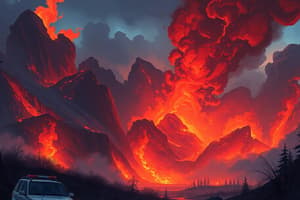Podcast
Questions and Answers
Which of the following actions contributes to disaster preparedness in the disaster management cycle?
Which of the following actions contributes to disaster preparedness in the disaster management cycle?
- Increasing vulnerability by neglecting public policies
- Implementing effective warnings and communication (correct)
- Ignoring previous disaster data
- Delaying planning until a disaster occurs
What is a key component of the disaster management cycle as referred in the curriculum?
What is a key component of the disaster management cycle as referred in the curriculum?
- Focusing solely on post-disaster relief efforts
- Randomly selecting strategies without analysis
- Shaping public policies to modify disaster causes (correct)
- Creating disaster scenarios without data
What essential skill is required to formulate strategies for future disaster mitigation?
What essential skill is required to formulate strategies for future disaster mitigation?
- Ability to guess disaster outcomes
- Reliance on outdated disaster management techniques
- Disregarding lessons learned from previous disasters
- Capacity to obtain and analyze information on risks (correct)
Which of the following natural disasters is included in the syllabus of Unit I?
Which of the following natural disasters is included in the syllabus of Unit I?
Which phenomenon is covered under Unit II of the Disaster Management course?
Which phenomenon is covered under Unit II of the Disaster Management course?
Flashcards
Disaster Management Cycle
Disaster Management Cycle
The set of actions taken to prepare for a disaster, minimizing its impacts, and recovering afterward. It involves four phases: mitigation, preparedness, response, and recovery.
Disaster Mitigation
Disaster Mitigation
Actions taken to reduce the likelihood of a disaster occurring or lessen its potential impacts.
Disaster Preparedness
Disaster Preparedness
The actions taken to prepare for a disaster, including planning, training, and creating emergency kits.
Disaster Response
Disaster Response
Signup and view all the flashcards
Disaster Recovery
Disaster Recovery
Signup and view all the flashcards
Shaping Public Policies
Shaping Public Policies
Signup and view all the flashcards
Capacity to Obtain and Analyze Information
Capacity to Obtain and Analyze Information
Signup and view all the flashcards
Effective Warnings and Communications
Effective Warnings and Communications
Signup and view all the flashcards
Natural Disaster
Natural Disaster
Signup and view all the flashcards
Earthquake
Earthquake
Signup and view all the flashcards
Tsunami
Tsunami
Signup and view all the flashcards
Volcano
Volcano
Signup and view all the flashcards
Drought
Drought
Signup and view all the flashcards
Famine
Famine
Signup and view all the flashcards
Avalanche
Avalanche
Signup and view all the flashcards
Landslide
Landslide
Signup and view all the flashcards
Wildfire
Wildfire
Signup and view all the flashcards
Heatwave
Heatwave
Signup and view all the flashcards
Migration
Migration
Signup and view all the flashcards
Community Resilience
Community Resilience
Signup and view all the flashcards
Study Notes
Disaster Management Course Quiz Answers
- Question 1: Implementing effective warnings and communication contributes to disaster preparedness. Effective warnings and communication improve preparedness against disasters.
- Question 2: Shaping public policies to modify disaster causes is a key component of the disaster management cycle. This is crucial for disaster management.
- Question 3: The essential skill for formulating future disaster mitigation strategies is the capacity to obtain and analyze risk information. Strategies rely on analyzing and understanding disaster risk factors.
- Question 4: Volcanoes are included in the syllabus of Unit I. Volcanoes are a type of natural disaster covered in this unit of the course.
- Question 5: Drought and famine are covered under Unit II of the Disaster Management course. This unit includes topics like drought and famine.
Studying That Suits You
Use AI to generate personalized quizzes and flashcards to suit your learning preferences.




